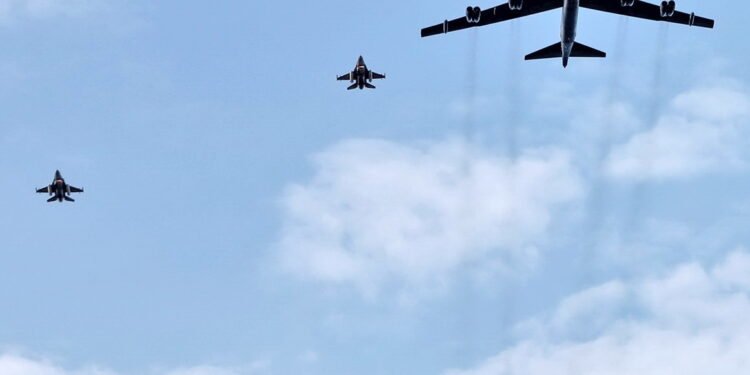
Making best possible use of flying – and training – time saw two USAF (United States Air Force) B-52H Stratofortress bombers “intercepted” by Royal Moroccan Air Force (RMAF) F-16s as escorts practising inter-operability.
US Africa Command (Africom), supported by US Strategic Command, has it the “intercept” was “a unique training opportunity”.
The bombers from the 20th Expeditionary Bomb Squadron, Barksdale Air Force Base, departed England for Morocco on 20 November. On entering Moroccan airspace they were “intercepted” by the F-16s en route to the Aoreora Range south of Agadir.
At Aoreora, Moroccan and US Special Operations joint tactical air controllers (JTACs) contacted the bombers to conduct a live munitions drop. The JTACs guided the bombers onto target, releasing two 500-pound bombs.
“Our ability to conduct these long-range missions across multiple combatant commands in co-operation with our partners on the continent highlights our partnership, continued military-to-military engagements and training when working with continental partners. These missions reinforce our commitment to African partners and allies while helping support regional and African security,” Major General Claude Tudor, Africom Director of Operations, said.
This event was another emphasising the longstanding relationship between Morocco and the US.

The B-52s flew from RAF Fairford in the United Kingdom to Morocco as part of a bomber task force mission, reinforcing the US’ ability to project strategic reach, long-range strike capabilities and provide reassurance of collective defence and security to partners and allies, Africom said.
The Moroccan interception coincided with a visit by US Marine Corps General Michael Langley, commander, Africom, to Djibouti, Somalia, and Kenya (21 to 28 November).
In meetings with Djibouti Armed Forces’ Minister of Defence, Hassan Omar Mohamed Bourhan, and the Djibouti Armed Forces’ Chief of Defence, General Zakaria Cheikh Ibrahim, Langley and Djibouti’s senior military leaders discussed current ‘atmospherics’ in regional security. The leaders furthered discussions on shared security interests, especially as it pertains to maritime security, which also resonated in discussions with the US Ambassador to Djibouti, Ambassador Cynthia Kierscht, and the Commander of Djibouti’s Coast Guard, Colonel Wais Omar Bogoreh, Africom reported.
During a meeting with Somali President, Hassan Sheikh Mohamud, the acting Minister of Defence of Somalia, Abdulkadir Mohamed Nur, and current Chief of Somali National Armed Forces, General Odawa Yusuf, Langley alongside the US Ambassador to Somalia, Richard H Riley IV, conversed about the impacts and potential challenges Somali states could experience as a result of the transition from ATMIS (African Union Transition Mission in Somalia).
“In Kenya, Africom’s commitment to enabling partner effectiveness and bilateral efforts on counterterrorism operations continued. In meetings with Kenyan President William Samoei Ruto, Minister of Defence, Soipan Tuya, Chief of Defence, General Charles Kahariri, and Chargé d’Affaires, Marc Dillard, the partners shared their concerns about regional security and emphasized the importance of partnership to promote peace and security in the region,” Africom said in a statement.









